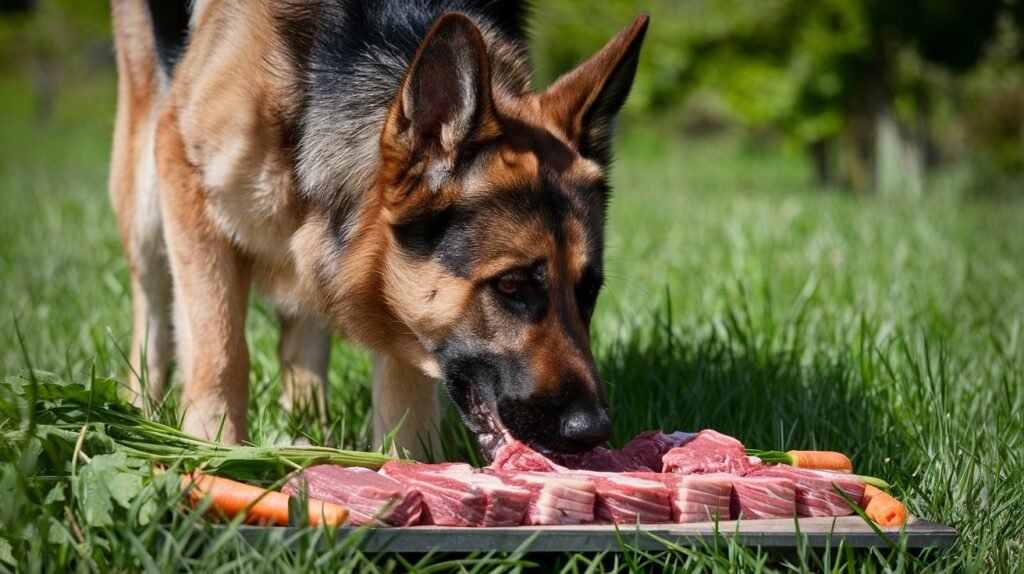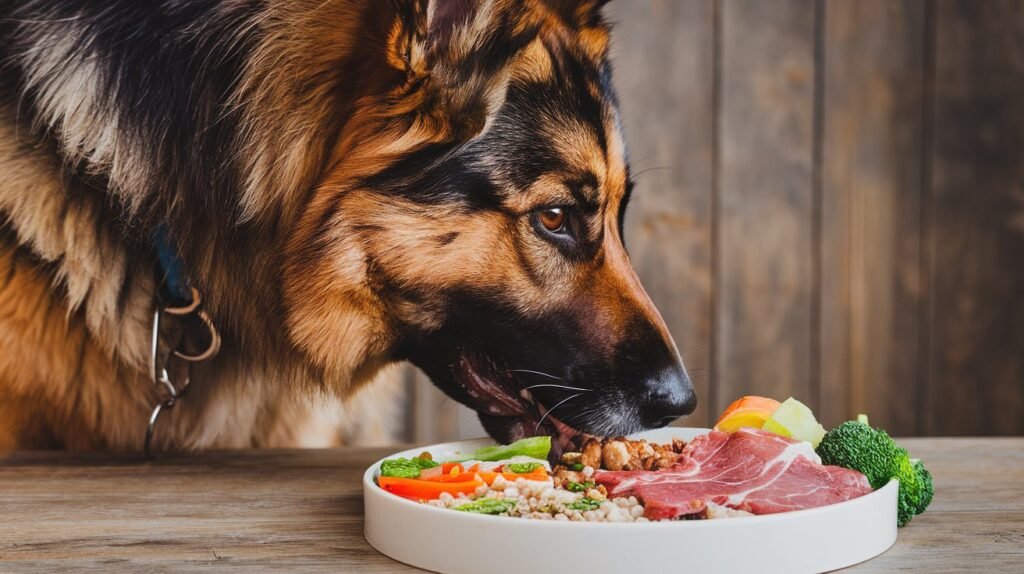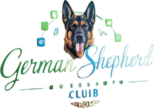German Shepherds are known for their intelligence, versatility, and loyalty. What makes an optimal diet for these remarkable dogs?
Crafting the ideal German Shepherd diet requires an understanding of their specific nutritional needs, which include high-quality proteins, healthy fats, and vital micronutrients.

Nutritional Needs of German Shepherds
German Shepherds possess a robust and dynamic physique, enabling them to perform various demanding tasks and activities.
To sustain their high energy levels, it is paramount to provide a diet rich in quality proteins and fats, contributing to muscle development, cognitive function, and overall vitality. Notably, protein sources should be derived from lean meats, poultry, and fish to ensure optimal amino acid profiles.
Furthermore, these majestic dogs thrive on a meticulous balance of vitamins and minerals. Essential nutrients like Omega-3 and Omega-6 fatty acids support joint health and a gleaming coat. Similarly, calcium and phosphorus are critical to maintaining strong bones and superior posture.
A carefully curated dietary plan also includes fiber-rich vegetables and whole grains, enhancing digestive health and preventing common gastrointestinal issues. This thoughtful approach not only sustains German Shepherds’ physical prowess but fortifies their immune system, fostering a life of strength, well-being, and longevity.
Key Components of a Balanced Diet
A balanced diet for German Shepherds encompasses well-rounded macronutrient profiles that cater to the breed’s specific needs. Proteins, fats, and carbohydrates must be meticulously balanced to support muscle mass, energy levels, and digestive health.
To achieve this, high-quality protein sources such as lean meats, poultry, and fish play a pivotal role in muscle development and overall vitality. Likewise, including healthy fats from sources like fish oil and flaxseed boosts cognitive function and maintains a glossy coat.
Adding fiber-rich vegetables and whole grains significantly improves gut health and supports sustained energy. These adjustments ensure a robust immune system and long-term wellness for your German Shepherd.
Protein Requirements
Protein is an indispensable component of a German Shepherd diet, ensuring optimal muscle development and sustaining energy levels essential for their vigorous lifestyle.
High-quality protein from lean meats significantly enhances a German Shepherd’s strength and endurance.
German Shepherds thrive on diets rich in protein, with veterinarians recommending 18-22% protein content for adult dogs. This high protein intake meets their elevated energy demands and supports overall health.
Puppies, with their rapid growth rates, require even more protein—up to 30%—to facilitate bone and muscle development. A tailored diet incorporating diverse protein sources will undoubtedly promote a robust and energetic German Shepherd.
Healthy Fats
Healthy fats are pivotal in a German Shepherd diet, providing essential energy and supporting overall health. These lipids help maintain a glossy coat.
Inclusion of fats supports cellular functions and nutrient absorption.
Feeds rich in Omega-3 and Omega-6 fatty acids are particularly beneficial, contributing to a healthy immune system and reducing inflammation, thereby promoting longevity.
When selecting dog food, prioritize sources with balanced healthy fat content from fish oil, flaxseed, and chicken fat. Properly formulated, this balance will support cognitive function, cardiovascular health, and joint lubrication, ensuring your German Shepherd remains active, vibrant, and thrives on every adventure.
Essential Vitamins and Minerals
A well-balanced German Shepherd diet must include essential vitamins and minerals to ensure optimal health and vitality. These nutrients are integral to the physiological functions that maintain a dog’s wellness.
- Vitamin A – Crucial for vision, immune function, and cellular growth.
- Vitamin D – Important for bone health and calcium absorption.
- Vitamin E – An antioxidant that protects cells from damage.
- Vitamin K – Essential for blood clotting and bone health.
- B Vitamins – Enhance energy metabolism, red blood cell production, and neurological function.
- Calcium – Necessary for robust bones and teeth.
- Phosphorus – Works with calcium to strengthen bones and teeth.
- Potassium – Supports proper muscle function and nerve transmission.
- Zinc – Vital for immune health, skin, and coat condition.
- Iron – Crucial for oxygen transport in the blood.
Incorporating these vitamins and minerals forms the cornerstone of a German Shepherd’s diet, promoting a strong immune system and overall well-being.
From vibrant energy to strong bones, each nutrient ensures your dog is ready to lead a healthy and fulfilling life.
Prioritizing these essentials in your German Shepherd’s diet propels them toward a radiant, thriving existence.

Commercial Dog Food Options
When exploring commercial dog food options, a wealth of nutritionally balanced, high-quality choices abound. Renowned brands provide formulations tailored to different life stages, addressing distinct nutritional needs. Selecting options with whole proteins, wholesome grains, and essential vitamins ensures your German Shepherd receives comprehensive nutrition in each serving.
Dry Kibble
An efficient and popular choice for many.
Quality dry kibble offers a convenient feeding solution. The best varieties provide a balanced composition of proteins, fats, and essential nutrients tailored to the German Shepherd diet. Importantly, these kibbles promote dental health through the natural scraping action as dogs chew, contributing significantly to maintaining clean teeth.
Proper storage ensures kibble remains fresh.
Dry kibble also excels in calorie control – it can be precisely measured to prevent overfeeding and maintain optimal body weight. Moreover, reputable brands undergo rigorous quality-control processes.
With quality assurance and balanced nutrition, meticulously chosen dry kibble fortifies your German Shepherd’s overall health, reflecting the pinnacle of convenience and nourishment in modern canine diet options.
Wet Canned Food
Wet canned food offers a highly palatable option, often relished by German Shepherds for its rich flavor.
Since 2016, numerous advances in wet food formulations have focused on delivering balanced nutrition packed with high-quality proteins, essential vitamins, and minerals, enhancing the German Shepherd diet and ensuring their well-being.
For those concerned about their dog’s hydration, this type of food’s high moisture content can be particularly beneficial. It effectively supports kidney function and maintains optimal hydration levels.
Although typically more expensive than dry kibble, many owners find the investment worthwhile for dogs with specific dietary needs, seniors needing softer foods, or those recovering from illness or surgery.
In conclusion, wet canned food can be an excellent supplemental option.
Homemade Diet for German Shepherds
Crafting a homemade diet for German Shepherds offers a unique, tailorable approach to their nutritional needs.
This type of diet allows dog owners to control every ingredient, ensuring their furry friend receives only the best. High-quality proteins, such as lean meats, and fresh vegetables can form the basis of a well-rounded meal.
For the best results, consulting with a veterinarian is advisable.
Cooking Balanced Meals
Creating balanced meals for your German Shepherd can significantly impact their health and vitality.
- Start with high-quality protein: Opt for lean meats, fish, or eggs to meet their protein needs.
- Incorporate healthy fats: Include sources like fish oil, olive oil, or flaxseed oil for coat and skin health.
- Add fresh vegetables: Carrots, spinach, and sweet potatoes provide essential vitamins and minerals.
- Include complex carbohydrates: Brown rice, oats, and quinoa can offer sustained energy throughout the day.
- Supplement with probiotics: Consider adding yogurt or specialized supplements for digestive health.
Preparation is key to ensuring nutritional balance. Make sure each meal comprehensively covers macronutrient and micronutrient needs.
Consistent, balanced meals lay the foundation for a long, happy, and active life for your German Shepherd.
Raw Food Diet
Adopting a raw food diet for your German Shepherd can lead to remarkable health benefits, improving everything from coat condition to energy levels.
A raw diet typically consists of uncooked meat, bones, fruits, and vegetables.
This diet aims to mimic what German Shepherds’ ancestors might have eaten in the wild, emphasizing whole, unprocessed foods to better align with their natural eating habits.
Executing a raw food diet requires due diligence to ensure your German Shepherd receives a balanced intake of essential nutrients. Consultation with a veterinarian specializing in canine nutrition is highly recommended. By carefully selecting and preparing raw foods, you can help your German Shepherd thrive, offering them vitality and resilience.
Foods to Avoid
Certain foods can harm your German Shepherd.
Chocolate, grapes, and onions are toxic to dogs. These foods can cause anything from digestive disturbances to severe organ damage, depending on the quantity ingested. It is essential to keep these foods entirely out of your dog’s reach to prevent any accidental consumption.
Avoid artificial sweeteners like xylitol.
This compound is extremely hazardous. Even small doses may lead to liver failure or other critical health issues.
Furthermore, fatty foods and excessive dairy should be restricted. They can lead to pancreatitis and gastrointestinal disturbances. Always choose items specifically designed for canine consumption, prioritizing your dog’s long-term health.
Feeding Schedules
Establishing a consistent feeding schedule is paramount for a German Shepherd’s digestive health and overall well-being. Ideally, young puppies should be fed three to four times a day, while adults typically do well on two balanced meals.
Consistency helps in regulating their metabolism and digestion. Avoid feeding your German Shepherd immediately before or after vigorous exercise to prevent bloating and ensure optimal nutrient absorption.
Puppies
A balanced diet is paramount for German Shepherd puppies, ensuring optimal growth and development.
- Protein-Rich Foods: Essential for muscle development and overall growth.
- Healthy Fats: Crucial for energy and brain development.
- Carbohydrates: Provide needed energy for their active lifestyle.
- Vitamins and Minerals: Support immune function and bone health.
- Calcium and Phosphorus: Essential for strong bones and teeth.
Feeding should be done multiple times a day to meet their nutritional needs.
Opt for high-quality puppy food specifically formulated for large breeds.

Adults
A meticulously balanced diet is essential for your adult German Shepherd to ensure vitality, strength, and an unwavering zest for life.
Select nutrient-dense food reflecting their active lifestyle.
Adults typically thrive on a diet rich in high-quality protein sources.
Incorporate healthy fats for sustained energy and a glossy coat.
Don’t forget the importance of fiber to aid digestion and maintain gut health.
Monitor portion sizes to avoid overfeeding, as maintaining a healthy weight is crucial. By adhering to these principles, you will sustain your dog’s optimal health and enrich their longevity.
Seniors
As German Shepherds age, their dietary needs evolve, necessitating adjustments to their nutrition to support longevity and quality of life.
Firstly, it is crucial to incorporate a diet higher in easily digestible proteins and lower in calories to prevent weight gain. Fats should also be reduced, while maintaining an adequate amount to support skin and coat health. Additionally, incorporating supplements such as glucosamine and chondroitin can aid joint health, which is vital as they are prone to arthritis.
Furthermore, senior German Shepherds benefit from a varied and balanced diet that includes antioxidants to bolster their immune system. Incorporating omega-3 fatty acids can help reduce inflammation and support cognitive function, essential for maintaining their mental acuity as they grow older.
Finally, constant monitoring and consultation with a veterinarian ensure that any changes in their health are promptly addressed, adjusting their diet accordingly. Tailored nutrition plans can alleviate common senior ailments such as kidney disease, obesity, and dental issues, thus empowering your German Shepherd to thrive during their golden years with vitality and grace.
Importance of Hydration
Hydration is crucial for German Shepherds.
Water plays a vital role in every bodily function. For German Shepherds, proper hydration is paramount to maintaining optimal health, aiding in digestion, nutrient absorption, and temperature regulation. Additionally, maintaining hydration levels supports joint lubrication, which is critical for such an active and vibrant breed.
Well-hydrated dogs display higher energy levels.
In contrast, dehydration can lead to severe health issues – from minor lethargy and decreased appetite to serious conditions like kidney failure. Ensuring easy access to clean, fresh water is essential for this breed, particularly since German Shepherds are highly energetic and exert themselves regularly.
Your vigilant attention to providing accessible hydration ensures their physiological needs are met, ultimately contributing to their overall well-being. Embracing this aspect of their care can empower your German Shepherd to lead a healthy, active, and joy-filled life.
Signs of Nutritional Deficiencies
Recognizing signs of nutritional deficiencies is paramount.
Nutritional deficiencies can manifest in numerous subtle ways. Your German Shepherd may show signs of lethargy, dull coat, or reduced appetite if their diet lacks essential nutrients. Additionally, deficiencies in specific vitamins or minerals may result in symptoms such as skin disorders, bone weaknesses, or impaired immune function.
Behavioral changes may indicate nutritional gaps.
Consistently monitoring your dog’s coat condition can help identify deficiencies early. For example, a diet deficient in essential fatty acids may lead to dry, flaky skin or a matted appearance, while inadequate protein intake can result in muscle wasting and general weakness.
By staying informed and attentive to your German Shepherd’s diet, you not only mitigate the risk of deficiencies but also ensure they thrive physically and mentally. Your commitment to their nutritional health is a cornerstone of their wellbeing and long-term vitality.
Consulting with Your Veterinarian
To craft an optimal diet for your German Shepherd, consulting your veterinarian is a crucial first step.
Your veterinarian, equipped with extensive knowledge and experience, can perform a thorough assessment, ensuring your German Shepherd’s diet is meticulously tailored to their specific needs. They will analyze various factors such as age, weight, activity level, and any underlying health conditions your dog may have, providing precision in dietary recommendations.
Furthermore, regular consultations allow continuous evaluation and adjustments as needed. Your veterinarian can help address any emerging health concerns, adjusting the diet to manage issues such as allergies, digestive problems, or weight management challenges that may arise through different life stages.
By leveraging professional expertise, you ensure that your German Shepherd receives a balanced and nutritionally complete diet. This partnership with your veterinarian not only optimizes your pet’s health but also fosters a proactive approach to their overall wellness, supporting a robust and thriving life.
